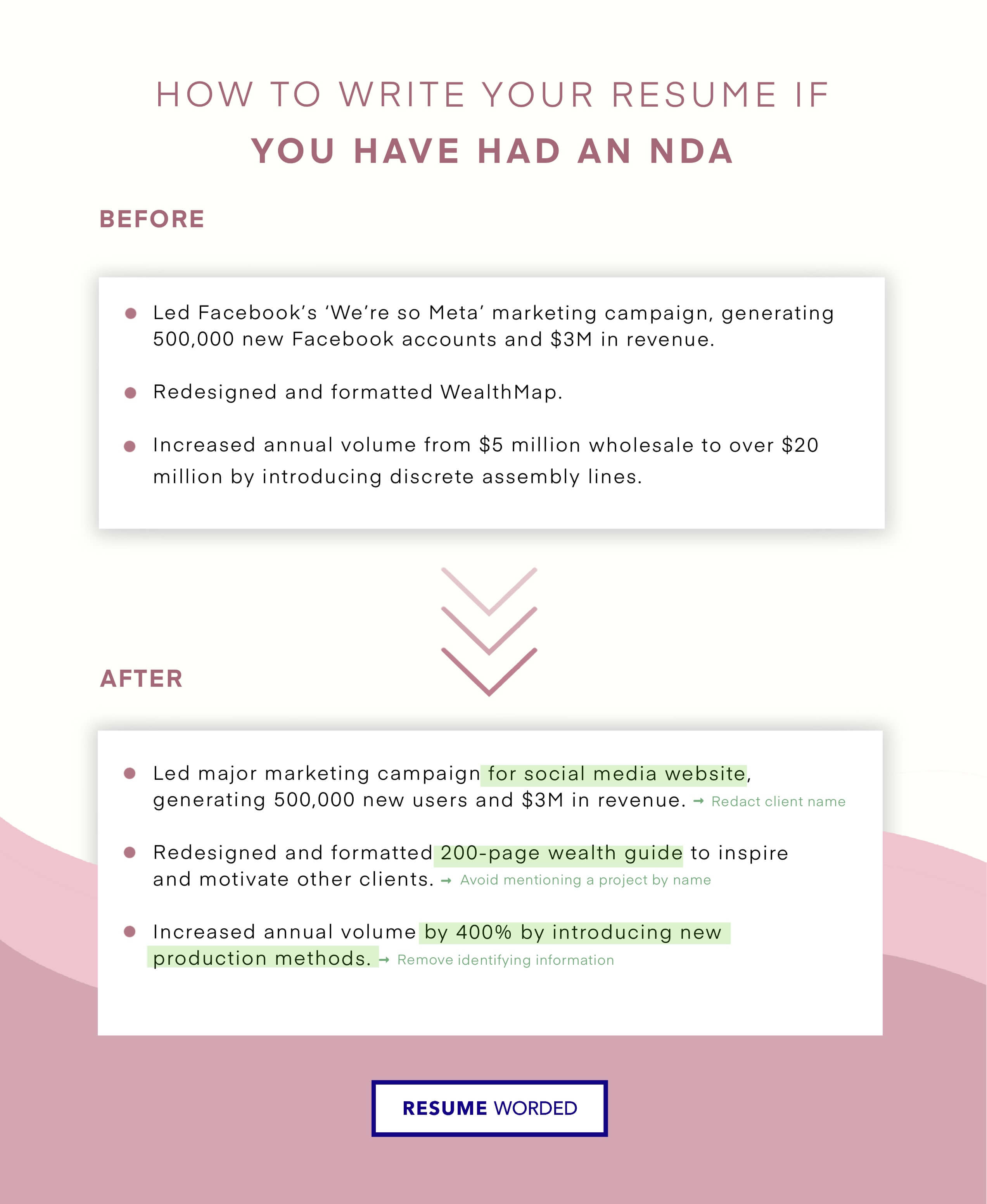
If you’ve completed work under an NDA, this guide will walk you through how to write a compelling resume without sacrificing confidentiality.
2 years ago • 7 min read

NDAs (non-disclosure agreements) aren’t uncommon, but they can be tricky to work with — especially if you’re trying to write a resume with an NDA in mind.
What is an NDA? Basically, it’s an agreement between you and a client or employer that you won’t talk about certain aspects of your work. This could include sensitive information, details of unreleased projects, or even the name of the client.
An NDA might seem like a dealbreaker for a resume — after all, how do you talk about your work if you can’t actually say anything about it? — but it doesn’t have to be. Here’s how to write an effective resume without violating your NDA.
Let’s go over each of those steps in a little more detail.
No two NDAs are exactly alike. NDAs vary in how strict they are, so make sure you know where the limits are. Can you talk about what you did for a project but not mention it by name? Reveal that you worked for a company but not the details of what that work entailed? It’s unlikely that you’ll need to leave it off your resume entirely, unless it was a matter of national security, so knowing exactly what you can and can’t say is an essential first step.
Look for information like:
Not only is this a good strategy for abiding by the terms of your NDA, it can also help recruiters by providing more context for your previous accomplishments. There are a few different ways you can do this:
Don’t use company names. Instead of “launched marketing campaign for Facebook,” change it to “launched marketing campaign for social media website.”
Don’t identify the project. Instead of “led 5-person team to design Robinhood app,” write “led 5-person team to design commission-free stock trading app.”
Don’t use absolute numbers. Instead of “closed government contract worth $5M,” keep things harder to identify with “closed new high-value government contract, increasing revenue by 10%.”

Hiring managers are unlikely to care if you leave out the details of a project as long as they can tell what you actually did. The best strategy for keeping your resume accomplishment-focused without straying into NDA-violating territory is to talk about the tools, languages, or platforms you used.
Example:
in your bullet points to avoid mentioning NDA projects by name" />
If it’s allowed under the terms of your NDA, you can mention it on your resume to explain why that section is light on details.
You can mention the NDA in your job title if you can’t say exactly what you did. For example, “NDA (Engineering Project).”
If you’re allowed to share your role in the project but not details about your accomplishments, you can list the NDA in your bullet points. For example, “subject to NDA, no further details available.
in your bullet points to explain a lack of details on your resume" />
A good way to find out if you have highlighted enough relevant accomplishments, soft skills, computer skills and any languages you have despite your NDA, is to upload your resume to the tool below — it’ll let you know if you’ve shown enough of these skills and accomplishments.
There are three types of NDAs: Unilateral, bilateral, and multilateral.
Sound confusing? It doesn't have to be. In simple terms:
For the purposes of discussing an NDA on your resume it doesn't matter what type of NDA you have — all that matters is what you are (and aren't) allowed to disclose.
If you’re under an NDA because you were in the military or have security clearance, your NDA is likely to be stricter about what you can and can’t say. The good news is, you should also have a little more guidance on how to navigate it. In particular:
If you were in the military, read our guide on how to include your military experience on a resume.
Worried about whether you're accidentally violating your NDA? Here are some examples of what not to do — and what to expect if you accidentally reveal confidential information.
If: You're prohibited from naming a client or employer.
Then: You can still discuss the project you worked for, but not by name if there's any chance of identifying information.
Example:
If you worked for Meta under an NDA, don't include an accomplishment like "generated 500,000 new Facebook accounts" — that makes it obvious who you worked for. Stick to something more generic, like "generated 500,000 new user accounts."

If: You're prohibited from disclosing that you completed a certain project.
Then: You can discuss your accomplishments in non-specific terms and include skills you gained during the project.
Example:
If you wrote a think piece for your CEO to publish under his own name and signed an NDA that prevents you from talking about it, you can't put that paper on your resume or upload it to your portfolio, but you can include a vague-but-related accomplishment, create a new piece on a similar topic for your portfolio, or write a blog post discussing some of the things you learned (without disclosing exactly how you learned them).

Can't talk about a client or project on your resume? That doesn't mean you need to forget it ever happened. Depending on the specifics of the NDA, you may be able to:
As always, check the specifics of your NDA before you proceed, and always err on the side of caution.
The consequences of violating an NDA should be spelled out in the NDA itself, but could also include:
Applying for a job where you’re likely to be handling sensitive information or under an NDA? Here are some basic guidelines to follow:
Ready to start writing your NDA-compliant resume? Let’s have a look at some concrete examples of resume accomplishments that won’t breach an NDA.